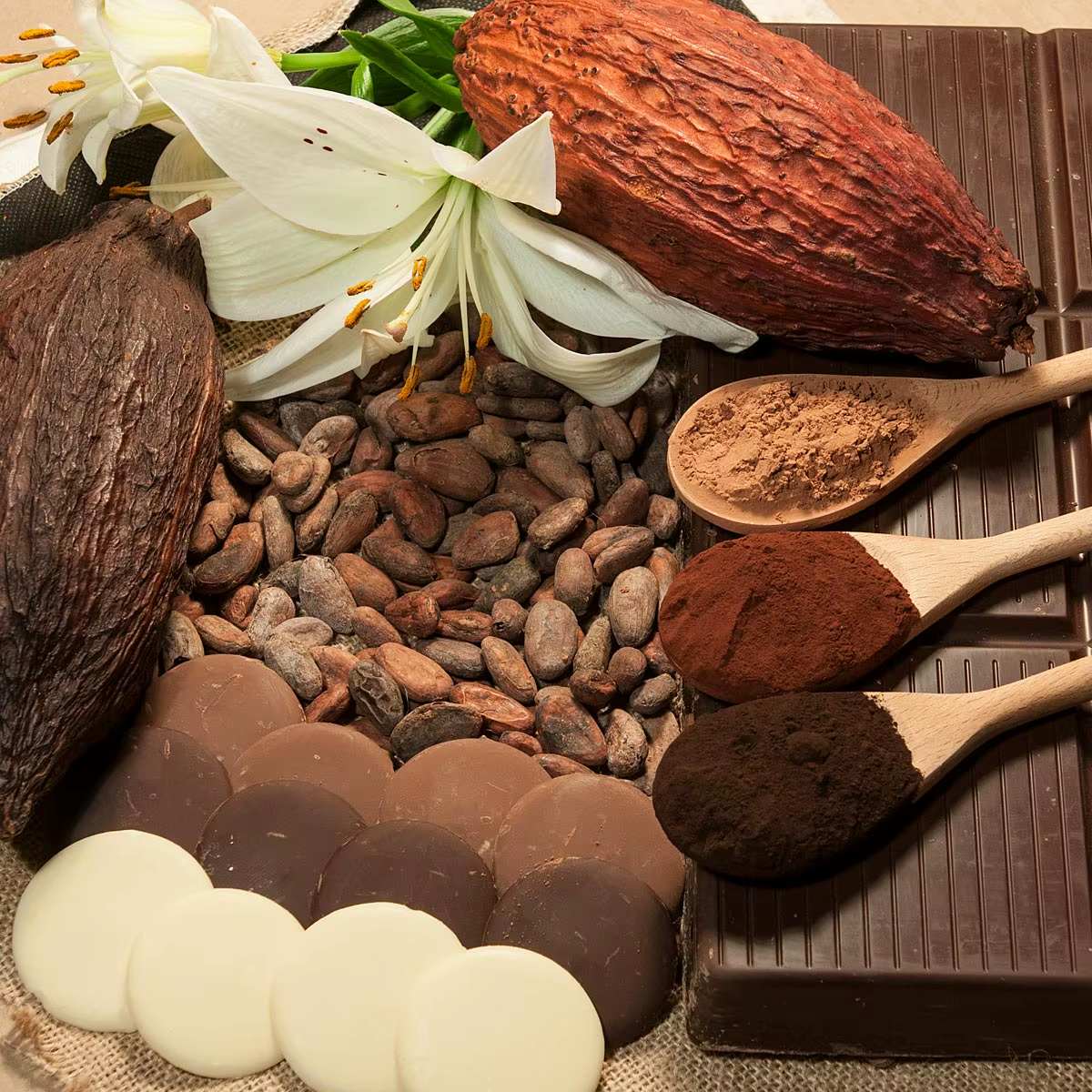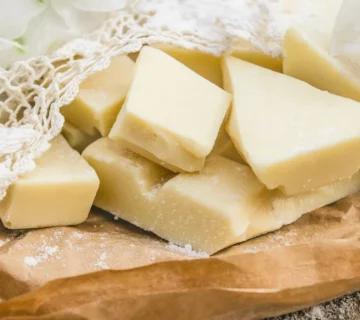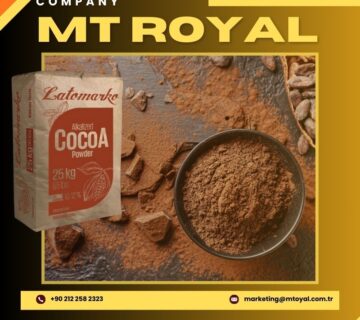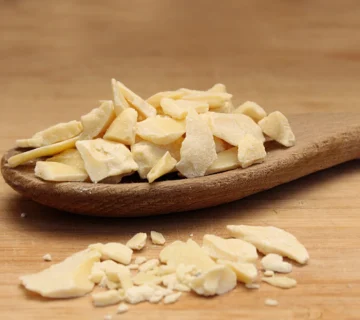In Iraq’s fast-developing food manufacturing sector, few ingredients hold as much importance—or quiet influence—as natural cocoa powder. Whether it’s used to bring depth to a chocolate filling, enrich a bakery glaze, or add a smooth bitterness to a dairy dessert, cocoa powder has become a cornerstone of industrial flavor creation. Yet for factory managers and procurement officers, sourcing natural cocoa powder in bulk is about far more than taste. It’s about stability, performance, and reliability at scale.
This article explores every key aspect of using and sourcing natural cocoa powder for Iraq’s manufacturing market—from the fundamentals of production to industrial applications, procurement strategy, and supplier selection. Along the way, we’ll share insights from the field, highlight trusted supply partners like MT Royal, and touch on European quality benchmarks exemplified by Latamarko, one of Spain’s respected cocoa ingredient producers.
Understanding Natural Cocoa Powder
To understand why natural cocoa powder remains so dominant in Iraq’s food industry, it helps to start with what “natural” really means. Unlike alkalized or “Dutch-processed” cocoa powder, natural cocoa powder is made by pressing roasted cocoa nibs to remove cocoa butter and then grinding the solids into a fine powder—without adjusting the pH. The result is a more acidic product with sharper chocolate notes, a reddish-brown color, and a clean, authentic flavor profile.
Industrial manufacturers often prefer natural cocoa powder because:
- It delivers stronger flavor intensity, even at lower dosages.
- It reacts naturally with baking soda, making it ideal for cake and biscuit production.
- Its acidity helps balance sweetness in chocolate fillings and syrups.
- It offers consistent dispersion in dairy and beverage systems.
For confectionery plants in Iraq—where taste authenticity and cost efficiency are both critical—these characteristics make natural cocoa powder an irreplaceable ingredient.
Why Iraqi Manufacturers Rely on Bulk Cocoa Powder
When a confectionery line runs twenty hours a day, consistency is the lifeblood of production. Bulk natural cocoa powder gives manufacturers not only an economical advantage but also a technical one. Bulk purchasing minimizes packaging waste, stabilizes input prices, and allows better control over quality uniformity.
From Basra’s bakery plants to Baghdad’s chocolate factories, we’ve seen how companies that commit to long-term bulk supply agreements achieve greater predictability in flavor and color performance. For instance, a mid-sized confectionery producer in Erbil improved production efficiency by 14% after switching from small-batch local supplies to standardized bulk lots through an international distributor.
At MT Royal, we’ve worked closely with such facilities—helping them align product specifications, storage procedures, and logistics scheduling with international best practices. Our experience supplying manufacturing plants across the region shows that reliable sourcing can directly translate to higher throughput and fewer production halts.
Key Applications in Industrial Food Production
1. Chocolate and Confectionery Production
Natural cocoa powder is the foundation for coatings, fillings, and dusting powders. In large-scale chocolate manufacturing, it enhances the depth of flavor without altering the fat ratio in formulations. Factories producing bars, pralines, and spreads depend on its stable dispersion in both fat-based and water-based systems.
2. Bakery and Biscuit Manufacturing
For bakeries, cocoa powder’s interaction with leavening agents is crucial. Natural cocoa powder, being slightly acidic, reacts efficiently with sodium bicarbonate, yielding the light crumb structure desired in chocolate cakes and cookies. Many Iraqi bakeries use it to achieve the deep chocolate hue associated with international brands.
3. Dairy and Beverage Applications
From chocolate milk to yogurt, cocoa powder’s particle size and wetting behavior affect texture and visual appeal. Quality natural cocoa ensures easy rehydration and smooth mouthfeel. In the beverage sector, manufacturers in Iraq increasingly seek instantized or fine-mesh natural cocoa powders for improved mixability in cold drinks.
4. Nutritional and Functional Foods
A rising trend across the Middle East involves incorporating cocoa powder into protein shakes, health bars, and meal replacements. Here, natural cocoa’s pure flavor complements plant proteins without overpowering them—a benefit that appeals to Iraq’s growing wellness-oriented consumers.
How to Evaluate Quality in Natural Cocoa Powder
Not all cocoa powders are equal. When evaluating options for large-scale use, industrial buyers should consider these parameters:
| Parameter | What It Affects | Recommended Range for Industrial Use |
|---|---|---|
| Fat Content | Flavor richness, mouthfeel | 10–12% (standard) or 20–22% (premium) |
| pH Level | Color, taste, reactivity | 5.0–5.8 (natural cocoa) |
| Particle Size | Dispersibility, smoothness | 75–150 µm |
| Color Index | Product appearance | Consistent reddish-brown |
| Microbial Load | Safety, shelf life | ≤ Standard ISO limits |
| Moisture | Flowability, caking tendency | < 5% |
Factory managers know that small variations in these parameters can alter not only the end product’s color but also its viscosity and aeration behavior during mixing.
European suppliers, particularly Spanish brands like Latamarko, have long been recognized for achieving remarkable uniformity in these aspects. Their precision processing and quality control set a standard that many Iraqi plants benchmark against when testing new lots.
Procurement Insights: Avoiding Common Pitfalls
Industrial procurement isn’t just about securing the lowest cost per kilo. It’s about balancing price with stability and specification accuracy. Through years of experience, we’ve seen factory procurement teams in Iraq face similar challenges:
- Inconsistent Supply: Seasonal price fluctuations can disrupt production planning.
➤ Solution: Partner with a distributor that offers contracted bulk terms and warehousing capabilities. - Specification Drift: Small but unnoticed variations in pH or fat can affect product color and texture.
➤ Solution: Always request a Certificate of Analysis (COA) and perform pilot tests before full-scale integration. - Storage Mismanagement: Cocoa powder is hygroscopic; improper storage leads to clumping.
➤ Solution: Maintain RH below 65% and store in food-grade, sealed containers. - Over-Processing in Recipes: Trying to “darken” products using too much cocoa often raises cost without improving flavor.
➤ Solution: Work with suppliers to select a naturally darker variant rather than increasing dosage.
At MT Royal, we guide procurement teams on how to avoid these mistakes by providing detailed technical data and stable supply planning that aligns with their production calendar.
Why MT Royal Is a Trusted Cocoa Powder Partner
For many industrial buyers across Iraq, MT Royal has become synonymous with reliable sourcing. We supply manufacturers with a comprehensive range of cocoa powder options—from economy grades for large-scale bakery operations to premium natural cocoa suited for high-end confectionery and beverage lines.
Our advantage lies in supply flexibility. Whether a facility requires 25-kg paper bags, 1-ton totes, or container-level shipments, we tailor solutions around production flow and storage capacity. We’ve seen how even minor adjustments—like synchronizing delivery frequency with plant inventory cycles—can significantly reduce waste and storage costs.
And because we work with multiple international suppliers, including European producers such as Latamarko, we help customers compare technical profiles and select the best fit for their application rather than pushing a single brand. This consultative approach is what many Iraqi plant managers appreciate most.
The Spanish Standard: Latamarko and the Pursuit of Purity
Spanish manufacturing has earned a quiet reputation in the cocoa industry for its engineering discipline and flavor refinement. Latamarko, one of Spain’s respected cocoa ingredient producers, stands out for its precision processing and sustainability focus.
Latamarko’s natural cocoa powders are known for:
- Tight color consistency across production batches
- Exceptional wetting and dispersibility in both hot and cold systems
- Low moisture and excellent shelf stability for long storage in Middle Eastern climates
- Stringent quality control backed by European certifications
For Iraqi manufacturers seeking European-grade cocoa without prohibitive shipping costs, sourcing Latamarko products through a regional distributor like MT Royal delivers both access and assurance.
Managing Cocoa Powder Logistics in Iraq
The supply chain context in Iraq presents both opportunities and constraints. While the market is expanding rapidly, logistical complexity—especially around customs and inland transport—can pose challenges for factories that require uninterrupted ingredient flow.
Best practices include:
- Forecasting three months ahead: Helps secure consistent pricing and shipping space.
- Choosing inland-ready packaging: Reduces moisture damage during storage or transport delays.
- Leveraging local warehousing: Many suppliers, including MT Royal, provide regional storage for critical ingredients like cocoa powder.
- Maintaining supplier redundancy: Dual-sourcing prevents shutdowns in case of port congestion or political delays.
A well-structured supply chain doesn’t just save time—it ensures that your production line keeps moving, even when global conditions shift.
Trends Shaping Iraq’s Cocoa Ingredient Market
- Shift Toward Cleaner Labels:
Manufacturers are increasingly avoiding artificial flavorings, giving natural cocoa powder a boost as a “clean” and recognizable ingredient. - Growth of Local Chocolate Brands:
Domestic Iraqi chocolate and snack brands are on the rise, investing in European-quality standards to compete regionally. - Focus on Energy Efficiency:
Some factories are upgrading roasting and mixing equipment to reduce cocoa dust loss—small efficiency gains that translate to large savings. - Sustainability and Ethical Sourcing:
Brands that export products are under pressure to ensure traceability in their cocoa supply. Partnering with global suppliers who can provide ethical certifications strengthens brand reputation.
Pro Tips for Factory Managers and Production Teams
- Match cocoa grade to end product. Using premium cocoa for low-margin baked goods wastes budget; instead, select fat-optimized variants.
- Control mixing temperature. Excessive heat can degrade flavor volatiles—keep below 70°C during blending.
- Monitor particle size in drinks. Fine-mesh cocoa dissolves faster, reducing mechanical stirring time and energy cost.
- Document lot codes. Inconsistent batches can be traced faster when lot numbers are logged for every run.
- Train operators. Many flavor inconsistencies arise not from ingredients but from inconsistent dosing.
These small technical details separate average operations from world-class facilities.
FAQs from Iraq’s Manufacturing Sector
Q1: What’s the difference between natural and alkalized cocoa powder?
Natural cocoa has a lower pH (5–6) and a lighter, fruitier flavor. Alkalized powder is darker, smoother, and less acidic. For most bakery and dairy uses in Iraq, natural cocoa offers better reactivity and authentic taste.
Q2: How long can natural cocoa powder be stored in bulk?
Properly sealed and stored below 25°C, it can last up to 24 months without flavor loss. MT Royal’s logistics support ensures optimal conditions from import to factory shelf.
Q3: What fat percentage is ideal for chocolate production?
High-fat (20–22%) cocoa powder yields richer texture, suitable for premium confectionery. Standard 10–12% is ideal for bakery and beverage lines.
Q4: Does the origin of cocoa beans matter?
Yes. Bean origin influences acidity and aroma profile. Blends from West Africa and South America often achieve the best balance for industrial needs.
The Future of Cocoa Powder Manufacturing in Iraq
The future of Iraq’s confectionery and food sector is tied to how efficiently manufacturers integrate global quality standards into local production. As the market matures, we’ll see increasing demand for consistent, traceable, and high-performing cocoa ingredients. Suppliers who provide technical support—not just raw materials—will shape the next phase of industrial growth.
At MT Royal, we’ve seen firsthand how small improvements in ingredient choice or process control can yield measurable gains in product quality and cost efficiency. The factories embracing that philosophy are the ones setting new benchmarks across Iraq’s food sector.
Final Reflection
Every successful chocolate bar, every brownie, every swirl of cocoa-flavored cream begins with a powder—a natural cocoa powder that meets the exacting standards of industrial production. Behind that powder is a web of sourcing, quality assurance, and technical know-how.
For Iraq’s manufacturing plants, the journey toward excellence isn’t just about finding a supplier—it’s about finding a partner who understands both the flavor science and the factory floor realities. Whether you’re developing a new confectionery line or optimizing a bakery recipe, the right bulk cocoa powder can quietly elevate your entire operation.
latamarko alkalized cocoa powder lm60
cocoa powder for chocolate production-Best price
Food industry raw materials – list of products
Types of Gelatin from Turkish Manufacturer
Alkalized Cocoa Powder Bulk Supplier







No comment